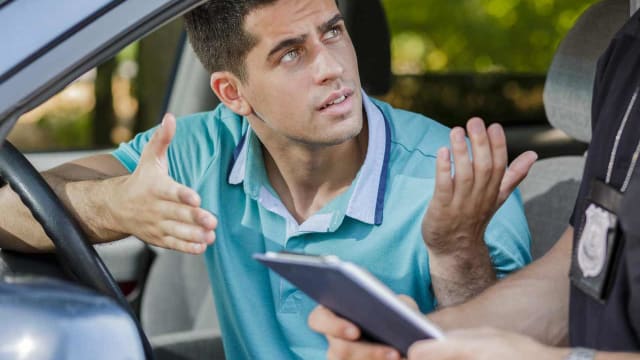If you were recently pulled over for failure to yield to an emergency vehicle in Illinois, you’re probably feeling overwhelmed. A Scott’s Law violation is not just another traffic ticket; the penalties can be serious, and many drivers don’t realize how quickly things can escalate.
At Dohman Law Group, our dedicated traffic lawyers have helped countless clients fight Scott’s Law violations and protect their driving records. Before you pay a fine or risk a license suspension, let’s walk through what Scott’s Law is, why it matters, and what options you have.
Don’t face a Scott’s Law violation alone. Dohman Law Group can help protect your license, fight your traffic ticket, and defend your future. Contact us today!
What is Scott’s Law?
Scott’s Law, often called the move over law, is one of the most important traffic safety laws in Illinois.
It was passed after the tragic death of Chicago fire lieutenant Scott Gillen of the Chicago Fire Department, who was struck and killed by a drunk driver while responding to a roadside emergency in 2000. To honor his memory and protect others, the Illinois General Assembly created Scott’s Law.

Under Illinois Vehicle Code 625 ILCS 5/11-907(c), the law requires drivers to:
- Slow down when approaching an authorized emergency vehicle or highway maintenance vehicle.
- Move over to another lane if possible, giving space to emergency responders.
- If you cannot safely change lanes due to traffic conditions, you must still reduce speed and proceed with caution.
- Use your hazard lights if necessary to warn other drivers.
This law applies not only to police and fire vehicles, but also to:
- Ambulances
- Tow trucks
- Highway maintenance vehicles
- Illinois Tollway and Illinois Department of Transportation vehicles with flashing emergency lights
What counts as a violation?
A violation happens anytime a driver fails to take proper action around an emergency vehicle or workers dealing with roadside emergencies.
Examples include:
- Not slowing down or moving over when passing a stopped squad car with flashing lights.
- Speeding past emergency response personnel helping at the scene of a traffic accident.
- Ignoring emergency signals or driving too close to the emergency lane.
- Failing to give space to firefighters, tow truck drivers, or emergency personnel.
In short, if there’s an emergency zone and you don’t adjust your driving, you risk a Scott’s Law violation.
Penalties for violating Scott’s Law
The consequences of breaking this law are much tougher than most traffic violations. Lawmakers and the Illinois State Police take this seriously because too many emergency responders have been injured or killed during traffic stops and roadside work.

Here’s what you could be facing:
Fines and misdemeanors
- A first-time violation typically starts with a class A misdemeanor, carrying fines of up to $10,000.
- If your actions cause property damage, your driver’s license may be suspended for at least 90 days.
Felony charges
- If the violation causes injury, it can become a class 4 felony.
- If someone is killed, you may be charged with a class 2 felony, which carries potential prison time.
License suspension
The Illinois Secretary of State has the authority to suspend or revoke your license:
- 90 days to 2 years if the violation results in damage or injury.
- Longer suspensions for repeat offenders.
These penalties are harsh because Scott’s Law violations often put lives, including those of Illinois State Troopers, Chicago firefighters, and emergency response personnel, at risk.
Impact beyond the fine
A Scott’s Law violation doesn’t just mean a high fine. It can affect nearly every part of your life:
- Insurance premiums often skyrocket after a conviction.
- Employers who check your driving record may see the violation.
- You could lose your driving privileges right when you need them most.
- If the violation is charged as a felony, you may even face time in prison under Illinois law.
This isn’t just a traffic ticket; it’s something that can change your future.

Why police enforce Scott’s Law strictly
The Move Over Task Force was created to reduce Scott’s Law violations and keep emergency personnel safe. Sadly, every year, the Illinois State Police report multiple troopers struck by drivers who fail to move over.
The law is not just about rules; it’s about saving lives. Imagine being a Chicago fireman, a tow truck driver, or a state trooper standing inches from traffic while responding to a call. One careless driver could cost them their life.
That’s why you’ll see strict enforcement along highways, during traffic stops, and at accident scenes.
Defending against a Scott’s Law violation
If you’ve been ticketed, don’t assume you’re guilty. There are defenses. A skilled traffic ticket defense attorney can challenge the violation.
Possible defenses include:
- Unsafe traffic conditions: You couldn’t safely change lanes due to congestion.
- Unclear emergency signals: The vehicle’s emergency lights were not clearly visible.
- Confusion with emergency rule changes: Sometimes, new enforcement efforts cause drivers to make mistakes without intent.
- Documentation: Dashcam or witness statements may show you did slow down or move over.
At Dohman Law Group, we review every detail, from the officer’s report to the conditions on the road, to build a strong defense.
Learn more: How long do traffic violations stay on your record in Illinois
How to avoid violating Scott’s Law
The best defense is prevention. Here are simple ways to stay safe and avoid violations:
- Always stay alert, especially on highways.
- Slow down as soon as you see flashing lights.
- Use your hazard lights to signal to others that traffic is slowing.
- Keep extra distance from emergency zones.
- Treat all stopped vehicles with flashing lights as potential emergency vehicles.
Practicing these habits will help you pass your driver’s license test, keep you safe, and protect emergency responders.

Protect yourself and protect others
Illinois Scott’s Law is about protecting the lives of firefighters, police officers, and every emergency responder who puts themselves in danger to help during roadside emergencies. But if you’re facing a Scott’s Law violation, the penalties can put your license, your finances, and even your freedom at risk.
Don’t face this alone. The experienced traffic ticket defense attorneys at Dohman Law Group know Illinois traffic law and can help you fight charges, avoid harsh penalties, and protect your driver’s license.
If you or a loved one has been ticketed under Scott’s Law, contact Dohman Law Group today for immediate help. We’ll stand by your side and work to keep your record and your future safe.


